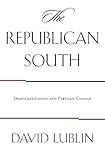The Republican South : Democratization and Partisan Change / David Lublin.
Material type: TextPublisher: Princeton, NJ : Princeton University Press, [2022]Copyright date: ©2004Description: 1 online resource (264 p.) : 28 line illus. 13 tables. 10 mapsContent type:
TextPublisher: Princeton, NJ : Princeton University Press, [2022]Copyright date: ©2004Description: 1 online resource (264 p.) : 28 line illus. 13 tables. 10 mapsContent type: - 9780691227870
- Conservatism -- Southern States
- Party affiliation -- Southern States
- POLITICAL SCIENCE / History & Theory
- Alabama
- Appalachia
- Arkansas
- Baptists
- Civil War
- Emancipation Proclamation
- Fifteenth Amendment
- Florida
- Georgia
- Goldwater, Barry
- Great Depression
- Holton, Linwood
- Jews
- Johnson, Lyndon
- King, Gary
- Kousser, J. Morgan
- Latinos
- Louisiana
- Massachusetts
- Mexican Americans
- Mississippi
- National Voter Registration Act
- New Deal
- Norwood, Charles
- O’Connor, Sandra Day
- Pennsylvania
- Reconstruction
- Thurmond, Strom
- abortion
- affirmative action
- biracial coalitions
- candidate pool
- candidate quality
- corruption
- dealignment
- democratization
- disfranchisement
- double crossovers
- dual campaigns
- economic issues
- elites
- gay rights
- independents
- initiative
- institutions
- open seats
- partisanship
- party organizations
- polarization
- racial context
- realignment
- school prayer
- social issues
- JK2356
- JK2356
- online - DeGruyter
| Item type | Current library | Call number | URL | Status | Notes | Barcode | |
|---|---|---|---|---|---|---|---|
 eBook
eBook
|
Biblioteca "Angelicum" Pont. Univ. S.Tommaso d'Aquino Nuvola online | online - DeGruyter (Browse shelf(Opens below)) | Online access | Not for loan (Accesso limitato) | Accesso per gli utenti autorizzati / Access for authorized users | (dgr)9780691227870 |
Frontmatter -- Contents -- List of Figures -- List of Tables -- Preface -- Acknowledgments -- Chapter One Introduction -- Chapter Two The Pace of Republican Gains -- Chapter Three Strategic Elites and Partisan Choice -- Chapter Four The Role of Institutions -- Chapter Six Issues and White Partisanship -- Chapter Seven The Future of Southern Politics -- Appendix -- Index
restricted access online access with authorization star
http://purl.org/coar/access_right/c_16ec
This comprehensive and in-depth look at southern politics in the United States challenges conventional notions about the rise of the Republican Party in the South. David Lublin argues that the evolution of southern politics must be seen as part of a process of democratization of the region's politics. The Voting Rights Act of 1965 provided a sharp jolt forward in this process by greatly expanding the southern electorate. Nevertheless, Democrats prevented Republicans from capitalizing rapidly on these changes. The overwhelming dominance of the region's politics by Democrats and their frequent adoption of conservative positions made it difficult for the GOP to attract either candidates or voters in many contests. However, electoral rules and issues gradually propelled the Democrats to the Left and more conservative white voters and politicians into the arms of the Republican Party. Surprisingly, despite the racial turmoil of the civil rights era, economic rather than racial issues first separated Democrats from Republicans. Only later did racial and social issues begin to rival economic questions as a source of partisan division and opportunity for Republican politicians.
Mode of access: Internet via World Wide Web.
In English.
Description based on online resource; title from PDF title page (publisher's Web site, viewed 29. Jun 2022)


